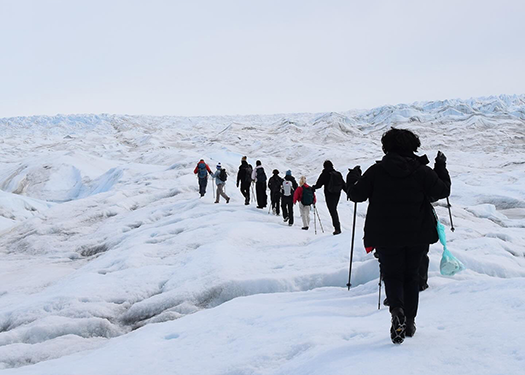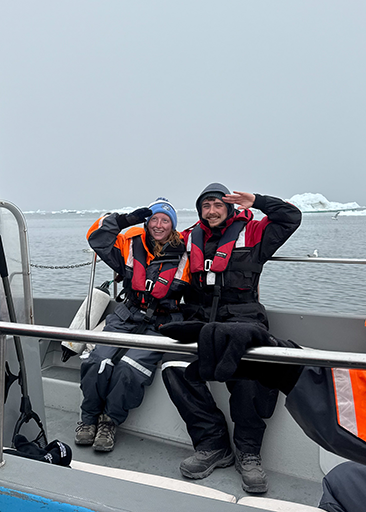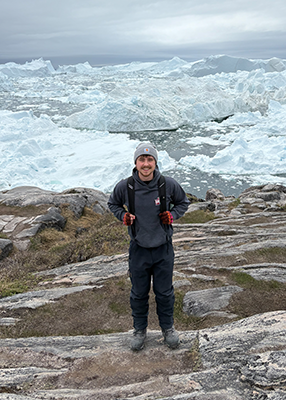From the Classroom to the Arctic: FGCU Student Explores Climate Change in Greenland
October 09, 2025 / Lexi Velte / Tags: Environmental Engineering (B.S.Env.E.), Denmark, Study Abroad, climate change, arctic, Greenland

When environmental engineering student Shamus Shannan met with FGCU’s study abroad advisor, he had no idea that it would lead to one of the best experiences of his life.
Shamus attended a study abroad research program based in Copenhagen, Denmark that studied climate change in arctic systems. The project had a few different components, such as studying terrestrial permafrost, freshwater ecosystems, and marine ecosystems in and around Greenland. He was able to put into practice what he learned in the classroom, from chemistry to climatology.
In the Field
“Day-to-day life in Copenhagen and Greenland was extremely different,” he said. He was in Greenland during a period called the midnight sun, which means that the sun never sets, and it is light out for 24 hours a day.
 “Our main goal while in Greenland was to gather field data to bring home with us to
Denmark where we would then analyze it for our individual research projects. We would
wake up early in the morning, put on our winter gear, and usually hike long distances
to reach isolated biological systems.” When they weren’t hiking, they traveled by
plane or took boats out to collect marine samples.
“Our main goal while in Greenland was to gather field data to bring home with us to
Denmark where we would then analyze it for our individual research projects. We would
wake up early in the morning, put on our winter gear, and usually hike long distances
to reach isolated biological systems.” When they weren’t hiking, they traveled by
plane or took boats out to collect marine samples.
Though his entire time abroad was memorable, a few moments stood out to Shamus as particularly meaningful. The first was when the research team ascended the vast ice sheets to collect untouched samples.
“We had to put spikes on our boots to cling to the ice and trekked straight up the glaciers to the pure ice. The view of the endless ice is one that I will never forget, and it made me feel very small.”
The view of the endless ice is one that I will never forget, and it made me feel very small."
Shamus also took part in a rite of passage for visitors to the Arctic research station on Disko Island – he swam in the frigid water to touch an iceberg.
“The water was absolutely freezing, only 2 degrees Celsius, but the feeling of accomplishment was unlike any other,” he said.
City Life
Copenhagen was a different world from Greenland. Shamus lived in a suburb of Copenhagen called Frederiksberg in an apartment he shared with local Danish students.
“It was a city with modern amenities. My classmates and I would take the metro to the center of the city. It was a little tricky to figure out at first but eventually the route became second nature.”
After class he’d take a train to Nyhavn to study at his favorite coffee shop. He also spent time going on runs or swimming in the canals with his friends.
Taking Time to Reflect
 Reflecting on his experience, Shamus said, “This experience opened my eyes to different
cultures, peoples, and ideas that I had never experienced before, and [it] was instrumental
in widening my worldview. Interacting [with] and living in a society that is so different
from my own was both terrifying and exhilarating and forced me out of my comfort zone
more than any other experience I've had.”
Reflecting on his experience, Shamus said, “This experience opened my eyes to different
cultures, peoples, and ideas that I had never experienced before, and [it] was instrumental
in widening my worldview. Interacting [with] and living in a society that is so different
from my own was both terrifying and exhilarating and forced me out of my comfort zone
more than any other experience I've had.”
The content of the course and the research also influenced his future plans, pushing him toward research and field work. He’s even considering going to grad school in the Netherlands or Germany.
“I was forced to face the challenges and opportunities that come with living abroad alone, which allowed me to grow and change as a person. It was undoubtedly one of the best experiences of my life.”
I was forced to face the challenges and opportunities that come with living abroad alone, which allowed me to grow and change as a person."
Advice for Other Students
When asked what advice he’d like to share with other students, Shamus said, “My biggest piece of advice for those wishing to study environmental engineering is to really understand what it means. It is much more human than the name suggests. It will challenge you to face real-world issues like water management and energy production.”
He hopes other students will be inspired by his experience to take the same leap with a study abroad research program.
Share Post
